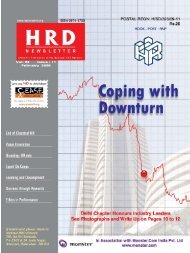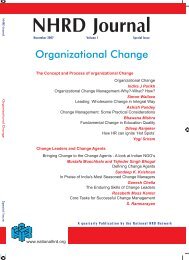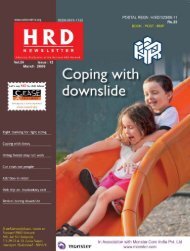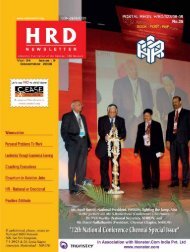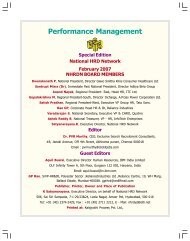Challenge for HR - National HRD Network
Challenge for HR - National HRD Network
Challenge for HR - National HRD Network
Create successful ePaper yourself
Turn your PDF publications into a flip-book with our unique Google optimized e-Paper software.
and Mr Inder Walia, Group <strong>HR</strong> Director of<br />
the Bharti Group who spoke about his<br />
learnings whilst managing the <strong>HR</strong><br />
responsibility at Arcelor Mittal.<br />
Prof Peter Cappelli of The Wharton<br />
School, who directed the Research Study<br />
jointly undertaken by The Wharton School<br />
and the <strong>National</strong> <strong>HR</strong>D <strong>Network</strong>, on “The<br />
DNA of Business Leadership,” presented<br />
the findings of the Study and released the<br />
preliminary report of the Study to Mr Aquil<br />
Busrai, <strong>National</strong> President and to Mr Vivek<br />
Paranjpe, <strong>HR</strong> Advisor of Reliance<br />
Industries. Reliance Industries had<br />
sponsored the Research Study in which<br />
over 100 Chief Executives of Indian<br />
corporations participated.<br />
Dr Pallab Bandyopadhyay, Mr R<br />
Vidyasagar and Prof Premrajan of XLRI<br />
presented the salient features of<br />
CompMode to the delegates.<br />
A unique feature of the Conference was the<br />
session on social entrepreneurship which<br />
aimed to enable delegates learn from the<br />
experience of social entrepreneurs working<br />
in the non-corporate sector. Speakers<br />
included Mr Vishal Talreja of the Dream a<br />
Dream Foundation and Gargi Banerjee of<br />
Pragya. These sessions were truly<br />
exhilarating.<br />
The Valedictory Session brought the<br />
curtains down on the <strong>National</strong> Conference.<br />
Mr S K Roongta, Chairman of SAIL<br />
delivered the Valedictory Address and Prof<br />
Jitendra Singh, Dean and Shaw Professor<br />
of the Nanyang Business School, Singapore<br />
and Paul Steinberg Professor of<br />
Management at Wharton was the Chief<br />
Guest. He spoke on “How will we make this<br />
India’s Century.”<br />
The Eastern Region of the <strong>National</strong> <strong>HR</strong>D<br />
<strong>Network</strong> honoured four social<br />
entrepereneurs <strong>for</strong> their unique service to<br />
society and <strong>for</strong> choosing the road less<br />
traveled. They were Mr Vishal Talreja of<br />
Dream a Dream Foundation, Ms Gargi<br />
Banerjee and Mr Sunil Pillai of Pragya and<br />
Sr Cyril Mooney of the Rainbox Education<br />
Project working with street children in<br />
Kolkata. Mr Roongta presented the “Most<br />
Promising Chapter Award “ to the Nagpur<br />
Chapter and the “Best Chapter Award” to<br />
the Delhi Chapter.<br />
The curtains came down on the 11th<br />
<strong>National</strong> Conference at 6.30 pm on<br />
Saturday, December 1 st , 2007. We now look<br />
<strong>for</strong>ward to the 12 th <strong>National</strong> Conference to<br />
be held in Chennai in 2008. The delegates<br />
carried away with them “saplings” as<br />
mementoes that they will plant and nurture<br />
and as these saplings grow they will serve<br />
as a reminder of the Conference and in the<br />
process help in a small way in greening<br />
our environment. The baton has now been<br />
passed on from Kolkata to Chennai.<br />
UDAIPUR DECLARATION - November 3, 2007<br />
Second International Dialogue on “Economics of Non-violence: Cultural Values & Ethics” was held at<br />
Pragya Shikar, Mahapragya Vihar, Bhuwana, Udaipur, during November 1-3, 2007.<br />
The dialogue concluded:<br />
1. The present day Economics<br />
emphasises largely materialistic<br />
development; in its place, it is necessary<br />
to develop a new economic concept<br />
which is based on balanced cultural,<br />
social, spiritual and material<br />
development in society.<br />
2. In order to keep social, political and<br />
economic aspects of life free from<br />
problems, it is necessary to connect<br />
development with the element of<br />
"trans<strong>for</strong>mation of consciousness” so<br />
that greed, selfishness, impertinence,<br />
etc. can be curbed and minimized.<br />
3. A new concept of Relative Economics<br />
is being developed so that people at<br />
large can be benefited by the economic<br />
development and ultimately the chasm<br />
of disparity between the rich and the<br />
poor, between rural and urban areas,<br />
between different regions of a country<br />
and communities is reduced through a<br />
process of inclusive development of all.<br />
4. The "Corporate Social Responsibility”<br />
should be borne by big business houses<br />
and industrial groups so that none<br />
should remain bereft of basic needs.<br />
Government should also per<strong>for</strong>m its role<br />
of social responsibility.<br />
5. The elements of non-violence,<br />
compassion, sensitiveness etc. should<br />
be strongly cultivated in the<br />
consciousness of people so that<br />
violence, cruelty, callousness etc. in<br />
human relations and behaviour may be<br />
curbed and consequently, a new society<br />
infused with amity, cooperation and<br />
peace may be constructed.<br />
6. Without controlling tendencies of<br />
individual accumulation and<br />
consumerism, it would not be possible<br />
to curb acts of violence, killings, crimes,<br />
terrorism etc.; keeping this in view, the<br />
consciousness of non-possessiveness<br />
or limitation of wants needs to be<br />
developed and the trend of voluntary<br />
"visarjana” (sharing with others) needs<br />
to be emphasized. Giving & caring <strong>for</strong><br />
others is a must <strong>for</strong> building a happy<br />
and congenial social order.<br />
7. "Roti" (i.e. bread), Ahimsa, Spirituality<br />
and Morality—all these four dimensions<br />
are to be considered simultaneously<br />
with respect to their development and<br />
<strong>for</strong> that the technique of “Training-in-<br />
Non-violence” should be administered.<br />
The entitlements <strong>for</strong> the poor should be<br />
stressed in this regards, so that their<br />
concerns are properly taken care of<br />
regarding food, shelter, education,<br />
health and other basic needs of life.<br />
8. Making a total change in the system of<br />
education, the technique of "emotional<br />
control” should be included in<br />
curriculum from the very beginning so<br />
that inspite of the growth of intellectual<br />
and economic competence, it can be<br />
put under control through the<br />
consciousness of Viveka (prudence) &<br />
children start imbibing the noble spirit<br />
of truth and non-violence from the early<br />
stage in life.<br />
9. To save the individual as well as society<br />
from the dreadful consequences of the<br />
lopsided material prosperity, giving rise<br />
to the internal restlessness, tension,<br />
conflict, environmental pollution etc., a<br />
paradigm shift in the development<br />
requires to be developed so that peace,<br />
true happiness, relaxed life and<br />
conservation of environment is<br />
guaranteed <strong>for</strong> all human beings.<br />
10. The Relative Economics should be<br />
centred round "human being” and not<br />
"matter”.<br />
11. Economic rationality needs to be<br />
extended to include cultural and ethical<br />
rationality. In fact, there should be<br />
complete convergence between<br />
economics, culture and ethics <strong>for</strong><br />
building a sustainable society. The<br />
necessary details should be worked out<br />
in this regard through further surveys<br />
and studies by experts in their<br />
respective fields.<br />
Ashok Bapna<br />
Convener<br />
| <strong>HR</strong>D News Letter | December 2007, Vol.23, Issue:9 7 |





